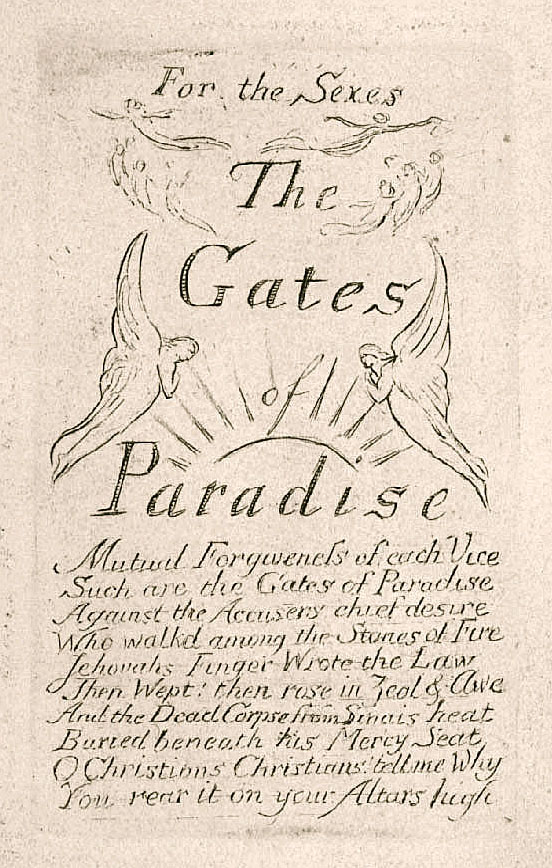A very prominent symbol in the Bible, 'stones' occurs 161 times in the Old and New Testaments. One that Blake especially loved accrues thus in Ezekiel:
Ezekiel 28
13 Thou hast been in Eden the garden of God; every precious stone was thy covering, the sardius, topaz, and the diamond, the beryl, the onyx, and the jasper, the sapphire, the emerald, and the carbuncle, and gold: the workmanship of thy tabrets and of thy pipes was prepared in thee in the day that thou wast created.
14 Thou art the anointed cherub that covereth; and I have set thee so: thou wast upon the holy mountain of God; thou hast walked up and down in the midst of the stones of fire.
The covering cherub! the stones of fire!
Blake may be best understood as an expander of the Bible. He made very good use of the two symbols mentioned above, and amplified the meanings used by Ezekiel:
Stones of Fire appears in the Prologue of The Gates of Paradise:
"Mutual Forgiveness of each Vice
Such are the Gates of Paradise
Against the Accusers chief desire
Who walkd among the Stones of Fire" (E 258)
To get a clue of the meaning we go to 1 Kings 18:38:
"Then the fire of the LORD fell, and consumed the burnt sacrifice, and the wood, and the stones, and the dust, and licked up the water that was in the trench."
This is from the account of Elijah's contest with the prophets of Baal.
We notice how the fire consumed the stone. We know the fire was from God, the stone a symbol of matter: Spirit burns up matter. That's Blake's message in a nutshell: spirit takes the place of matter. In our pilgrimage through life the material is gradually superseded by the spirit (God, Heaven).
'Stones of fire' represents a conjunction of matter and spirit. Ezekiel was speaking of a brilliant, successful potentate of his day, who had achieved greatly but who would be brought down by God. One such as was Lucifer, associated by Ezekiel and by Blake with the Covering Cherub (another name for Satan or the Selfhood).
Although Blake's source for the Covering Cherub was Ezekiel, Genesis 3:23 might have been Ezekiel's source:
"So he drove out the man; and he placed at the east of the garden of Eden Cherubims, and a flaming sword which turned every way, to keep the way of the tree of life."
In The Marriage of Heaven and Hell Blake had this to say about the Covering Cherub:
"The ancient tradition that the world will be consumed in fire
at the end of six thousand years is true. as I have heard from
Hell.
For the cherub with his flaming sword is hereby commanded to
leave his guard at the tree of life, and when he does, the whole
creation will be consumed, and appear infinite. and holy whereas
it now appears finite & corrupt." (Marriage of Heaven and Hell, Plate 14)
This shows what Blake thought of the biblical story of the Fall. In his myth the Fall occurs when man is kicked out of Eden (or just falls asleep), but the Return is set in motion also. In all versions of Blake's myth the end of the story is a happy event; the literary heads might call it a Romance rather than a Tragedy.
There's a great deal more to be said about the story of the Fall, especially about the Tree of Good and Evil; I'll tell you more about the Tree at a later date.
.

No comments:
Post a Comment